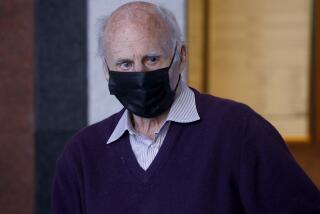If Fit for Trial, Suspect Could Defend Himself
- Share via
If Unabomber suspect Theodore Kaczynski is found competent to stand trial, he probably is legally capable of acting as his own attorney--even if he knows nothing about the law and is certain to destroy his defense, lawyers and mental health professionals said Thursday.
Under a 1976 U.S. Supreme Court precedent, judges must allow defendants to represent themselves if they can understand the proceedings against them, the role of a lawyer and the disadvantage of going to trial without one, several lawyers said.
“You are allowed to be the captain of your own ship, even if you are going to sink it,” said Los Angeles criminal defense lawyer Gerald Chaleff.
Peter G. Keane, chief assistant public defender in San Francisco, agreed. “The fact that the person is totally incompetent to represent himself is totally irrelevant,” he said. “It doesn’t make any difference if the person is going to botch the job.”
U.S. District Judge Garland Burrell Jr. indicated that he would order a competency evaluation for Kaczynski after the Unabomber suspect apparently tried to hang himself and insisted on representing himself as his trial was set to begin Thursday.
The defendant agreed for the first time Thursday to undergo a psychological exam as part of his quest to be his own attorney.
Although a competent defendant has a constitutional right to defend himself, legal experts said judges can deny such requests if they are deemed “untimely,” coming at too late a stage in the proceedings.
A defendant is legally considered competent if he rationally understands the charges and can cooperate with lawyers. Judges typically try to dissuade defendants from representing themselves, especially in capital cases where the stakes are literally life or death.
But sometimes a defendant insists.
“He has to be intellectually capable of assisting his defense, not necessarily willing, but capable of it,” said Keane, who predicted that Kaczynski will be found mentally competent.
Mental illness does not make a defendant legally unable to face trial, experts said.
“Just because he tried to hang himself does not mean he’s not competent to go ahead with a trial,” said Manuel St. Martin, a psychiatrist and lawyer who evaluates defendants in the federal court system. “He could be suicidal, he could be depressed. . . . It doesn’t rule out [mental competence] at all.”
Dr. Saul J. Faerstein, a psychiatrist and assistant clinical professor at UCLA, said Kaczynski is a “very strange and possibly psychotic guy who may very well be sane.”
“They don’t have overt evidence that he’s so out of touch that he’d be incompetent,” Faerstein said. “It’s only present state of mind that is relevant to competency.”
But Dr. Mark Levy, a forensic psychiatrist, said he believes Kaczynski is incompetent to stand trial.
He said Kaczynski is “probably legally sane but psychotic because he cannot cooperate with a reasonable defense and is disruptive of the proceedings.”
He noted that Kaczynski has been described as a paranoid schizophrenic and “part of the disease is denying the existence of the disease.”
“This man is clearly profoundly depressed and has been for years,” said Levy, a psychiatrist at the UC Medical Center in San Francisco. “You can become paranoid and delusional when you are chronically and severely depressed.”
If Kaczynski is found to be legally unfit to stand trial, he will be sent to a mental institution and stay there until psychiatrists find him well enough to return to court, lawyers said.
“The Kaczynski case is complicated by the fact that the defendant may have a mental illness that makes him unwilling to assist his lawyers in a mental defense,” Chaleff said. “But if he is found competent and can start the trial within a reasonable time, the judge has no choice [but to allow the defendant to represent himself] unless he wants to say it is not timely.”
Joshua Dressler, a law professor at McGeorge School of Law in Sacramento, said even a hurried decision on Kaczynski’s competency could set the trial in Sacramento back by several weeks.
“I think the best thing Judge Burrell could do now would be just to give up on this jury. . . . His best decision at this point is to assume this jury is lost,” Dressler said.
Dressler, who criticized the judge for not having resolved Kaczynski’s differences with his attorneys earlier, said the suspect probably will meet the legal definition of competence.
“What this is going to create is a travesty of the process,” Dressler said. “It’s a little like a car crash--we all want to watch it. A trial where a person represents himself is fascinating to watch, but it’s no way to decide a life-or-death case.”
Keane predicted that Burrell will either rule Kaczynski’s request “untimely” or allow him to act as his own attorney and appoint an attorney to act as a courtroom advisor.
If Kaczynski became disruptive, he could be put in a holding cell with a closed-circuit television to watch his trial and the lawyer who was supposed to advise him would take over, Keane said.
“The judge knows that if Kaczynski represents himself, it is going to turn into a complete circus just like the Long Island railroad shooter a few years ago,” Keane said.
In that case, gunman Colin Ferguson was charged with killing six people on a Long Island commuter train in December 1993. He represented himself in court proceedings that often took a bizarre twist.
Ferguson was convicted and a judge sentenced him in 1995 to spend the rest of his life in prison for the murders and the attempted murders of 19 others.
Times staff writer Mark Gladstone contributed to this report.
More to Read
Sign up for Essential California
The most important California stories and recommendations in your inbox every morning.
You may occasionally receive promotional content from the Los Angeles Times.













